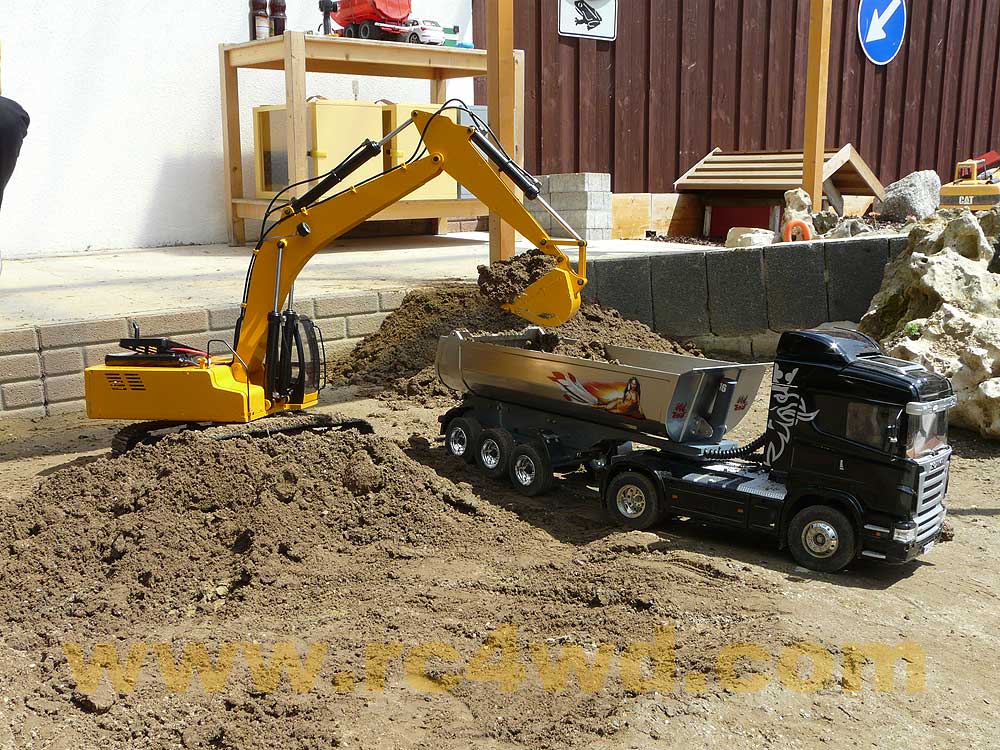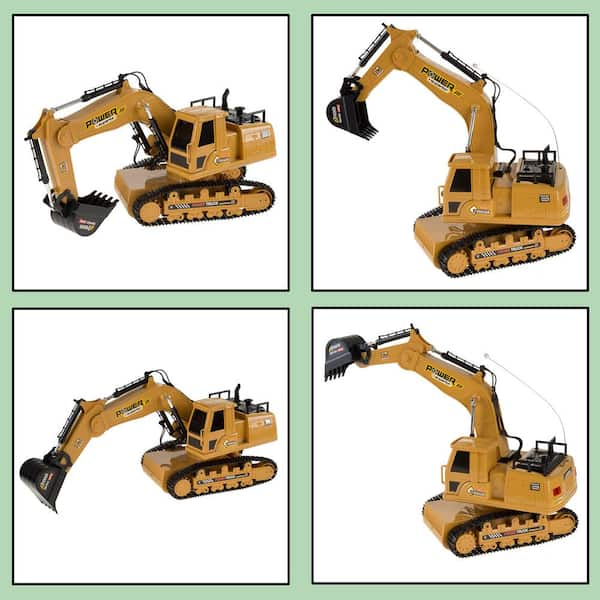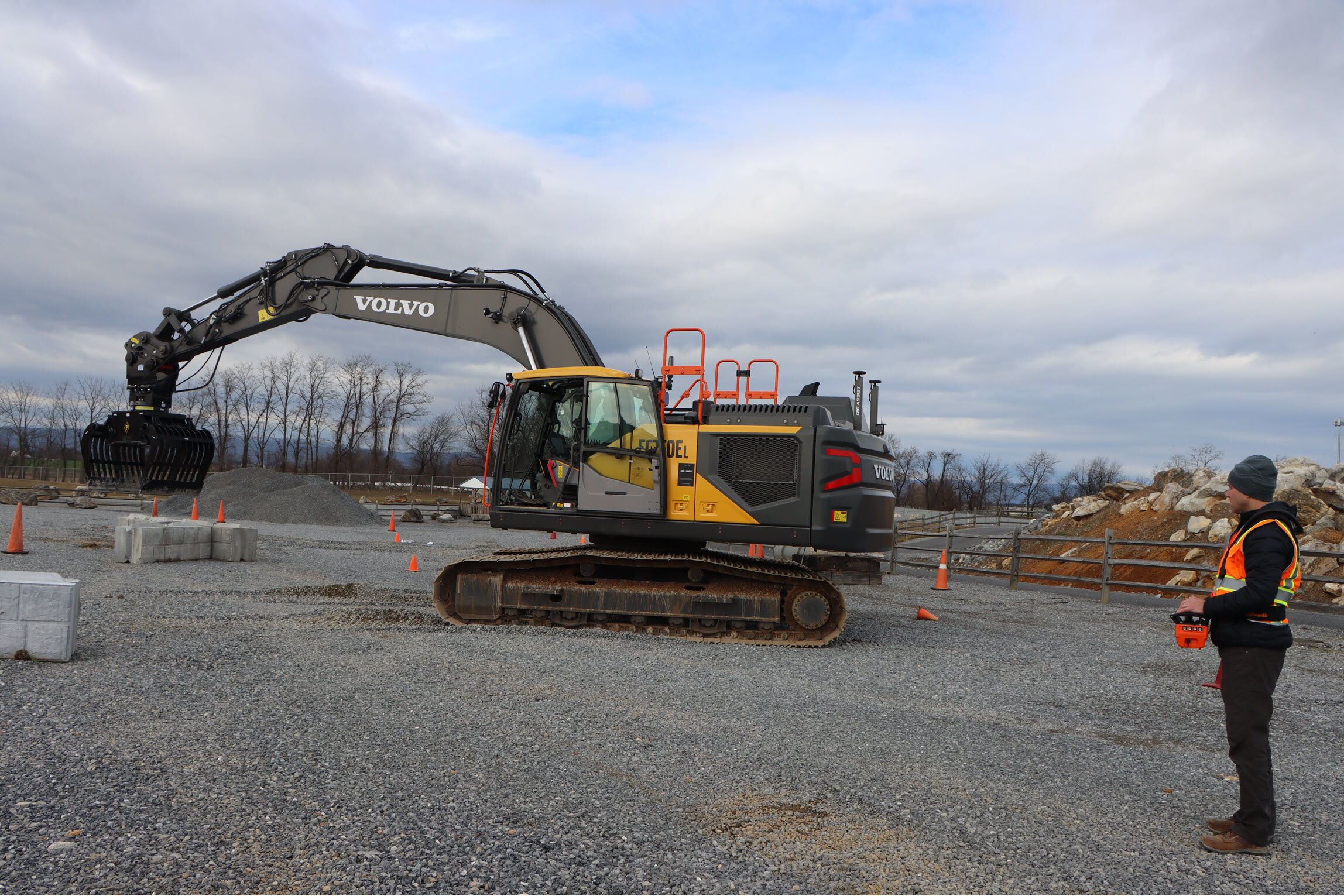The Top Benefits of Integrating a remote control excavator into Your Team
Wiki Article
Recognizing Exactly How Excavator Functions and Its Effect On Performance
Excavators play an important duty in building and mining operations, counting on an intricate interaction of mechanical and hydraulic systems. Their ability to perform a selection of tasks pivots on both their style and the modern technology integrated within. Understanding these elements can considerably impact operational effectiveness and productivity. As improvements proceed to reshape the industry, one must think about just how these changes will certainly affect future techniques and efficiency.The Essentials of Excavator Mechanics

The Function of Hydraulic Systems in Excavators
At the heart of excavator procedure lies the hydraulic system, which plays a pivotal function in powering the maker's activities and functions. This system uses pressurized hydraulic fluid to transfer energy, enabling various activities such as training, digging, and moving. By taking advantage of the concepts of hydraulics, excavators can carry out tasks with exceptional precision and force, boosting general functional efficiency.The hydraulic system is composed of crucial parts, consisting of pumps, shutoffs, and cylinders, which interact to manage the flow and instructions of the fluid. When the operator engages the controls, the hydraulic fluid is directed to certain cyndrical tubes, converting the operator's commands into physical movement. This system enables smooth and receptive actions, which are vital in building and excavation settings. double e volvo rc excavator. The effectiveness of the hydraulic system directly affects the performance and convenience of the excavator, making it an essential element in modern excavation proceduresSecret Parts of an Excavator
Comprehending the key parts of an excavator is essential for realizing exactly how this powerful equipment operates. An excavator contains several substantial elements, including the undercarriage, residence, boom, pail, and arm. The undercarriage gives security and flexibility, commonly including wheels or tracks to navigate various terrains. Your house consists of the engine and hydraulic systems, allowing the operator to regulate motion and power the equipment. The boom extends from the house, allowing vertical reach, while the arm attaches to the pail, facilitating digging and lifting operations.Additionally, the cab houses the driver, equipped with controls for precise handling. Each of these parts plays a crucial role in the excavator's general capability, adding to its effectiveness and efficiency on building websites. Understanding these parts assists in maximizing and maintaining excavator performance, making certain tasks are completed safely and efficiently.Accessory Adaptability and Its Advantages
Add-on adaptability is a necessary aspect of excavators, enabling drivers to switch in between numerous tools tailored for details tasks. This versatility not just enhances work performance but likewise adds to cost-effectiveness by minimizing the requirement for multiple devices. Understanding the different kinds of add-ons available can substantially affect the general efficiency and functionality of an excavator on job websites.Kinds of Accessories
While excavators are primarily acknowledged for their digging capacities, their true convenience hinges on the large selection of attachments offered. These accessories enhance the excavator's capability, enabling it to perform numerous tasks past excavation. Common add-ons include buckets (for excavating and scooping), hydraulic thumbs (for grasping materials), and augers (for drilling holes) Grapples are used for moving and dealing with debris, while rippers can break up difficult surface areas. Other specialized attachments, such as plates and rakes, allow excavators to adjust to particular job requirements. This variety not only increases the machine's utility throughout various industries, consisting of landscape design, building and construction, and demolition, however also enables drivers to customize their tools to fulfill specific project needs effectively.Increased Task Effectiveness
Maximizing task performance is a primary benefit of making use of numerous excavator accessories. Various attachments allow an excavator to perform multiple tasks without requiring to switch tools, conserving valuable time and labor. For circumstances, using a hydraulic hammer can damage concrete while a container add-on can excavate soil, making it possible for a seamless process. This convenience lowers downtime connected with equipment modifications and improves efficiency on-site. In addition, specialized attachments enhance accuracy in jobs such as grading or landscape design, leading to greater top quality outcomes. The capability to adapt to various task demands not only streamlines rc excavator procedures but likewise lessens the need for added machinery, making sure that projects are completed quickly and properly. On the whole, attachment versatility substantially contributes to boosted task efficiency in excavation job.Cost-Effectiveness and Flexibility
Cost-effectiveness is a substantial advantage of making use of versatile excavator accessories. These attachments permit a solitary excavator to carry out numerous tasks, reducing the demand for additional machinery and labor - double e volvo rc excavator. By switching over between containers, hammers, and grapples, drivers can take on numerous projects, from digging to demolition, thereby making the most of devices application. This adaptability not only decreases functional costs but additionally decreases downtime connected with changing equipment. In addition, the ability to personalize excavators with specialized accessories enhances productivity, as they can successfully take care of varied jobs according to project needs. To conclude, the combination of cost-effectiveness and flexibility in excavator attachments adds to boosted functional efficiency and source appropriation in construction and excavation tasks
Advanced Technology in Modern Excavators
Modern excavators are increasingly geared up with advanced technology that changes excavation procedures. Automation improves procedures, while improved fuel effectiveness decreases operational prices. Additionally, clever control systems enhance precision and safety and security, marking a substantial development in excavation tools.Automation in Excavation Processes
As excavation modern technology evolves, automation has actually become an essential component in enhancing performance and accuracy on work websites. Modern excavators are equipped with advanced automated systems that assist in tasks such as grading, digging, and trenching with marginal operator intervention. These systems utilize sensors, GPS, and maker understanding algorithms to guarantee exact positioning and deepness control, significantly lowering the margin for mistake. Furthermore, automation enables drivers to concentrate on critical decision-making instead of manual controls, bring about improved productivity in general. Such technologies not only simplify process but also enhance safety and security by reducing human mistake in complex procedures. The integration of automation in excavation processes stands for a substantial advancement in construction innovation, driving the industry in the direction of greater performance and efficiency.Improved Gas Effectiveness
Innovations in technology have actually additionally brought about significant improvements in gas effectiveness for contemporary excavators. Modern makers are outfitted with advanced engines that enhance power result while lowering gas usage. These engines make use of innovative burning innovations, such as turbocharging and direct fuel shot, to enhance efficiency and effectiveness. In addition, light-weight materials in building decrease overall weight, permitting for less power expenditure throughout procedure. The intro of variable speed controls enables drivers to adjust engine efficiency according to details jobs, additionally decreasing fuel use. Consequently, these improvements not just lower functional expenses but also add to environmental sustainability by minimizing emissions. In general, enhanced gas effectiveness in excavators is a crucial advancement that strengthens performance and financial practicality in the building and construction industry.Smart Control Systems
While operators browse significantly complicated task sites, wise control systems in excavators have actually become vital tools for improving efficiency and precision. These sophisticated modern technologies use formulas and sensing units to keep track of numerous specifications such as tons weight, terrain problems, and operational performance. By automatically adjusting hydraulic features, clever systems enhance maker efficiency, resulting in boosted performance and decreased wear on parts. In addition, operators take advantage of user-friendly interfaces that give real-time responses and diagnostics, permitting notified decision-making. This integration of technology not only improves procedures yet additionally decreases human mistake, adding to much safer job settings. As the construction industry continues to advance, wise control systems will play an essential role in shaping the future of excavator performance and efficiency.Enhancing Functional Performance With Excavators
Excavators play a necessary role in boosting functional efficiency across numerous construction and excavation jobs. Their convenience enables numerous tasks, consisting of lifting, excavating, and material handling, which improves workflows and minimizes the need for extra equipment. With powerful hydraulic systems, excavators can do sturdy tasks with accuracy, substantially reducing the moment called for to full projects. The combination of innovative modern technology, such as GPS and automated controls, further maximizes their procedure, enabling operators to achieve better precision and minimize product waste. Furthermore, modern excavators are designed to take in less fuel and decrease exhausts, adding to both expense financial savings and ecological sustainability. By utilizing excavators effectively, building groups can improve productivity, satisfy task deadlines, and boost general website management. This multifunctionality and efficiency make excavators vital tools in the contemporary building landscape.The Future of Excavators in Construction and Mining Industries
As the building and mining sectors evolve, the future of excavators is poised for substantial makeover driven by technical technology and altering functional needs. Advancements in automation and expert system are reshaping excavator abilities, permitting enhanced precision and performance in procedures. Self-governing excavators are arising, decreasing the demand for human intervention and decreasing the danger of accidents.Moreover, the integration of telematics and IoT modern technology enables real-time surveillance of machine performance and predictive maintenance, optimizing uptime. Green designs, consisting of hybrid and electrical models, are acquiring traction, lining up with sustainability objectives within the industry.Additionally, making use of advanced materials and lighter styles improves gas effectiveness while preserving performance criteria. As these fads development, excavators will play a vital function in fulfilling the increasing needs for productivity and safety in construction and mining, inevitably changing functional landscapes.Frequently Asked Inquiries
How Do Weather Influence Excavator Performance?

Climate condition greatly affect excavator performance, as rain and mud can impede traction and security, while extreme temperature levels may influence hydraulic systems. Operators has to adapt to these variables to guarantee suitable capability and safety throughout operations.
What Safety And Security Procedures Should Operators Comply With While Using Excavators?
Safety steps for excavator drivers consist of using proper individual safety tools, conducting pre-operation evaluations, guaranteeing appropriate interaction with ground personnel, maintaining a safe distance from above risks, and sticking to well established operational methods to avoid mishaps.How Often Should Excavators Be Preserved for Optimum Efficiency?
Excavators must be preserved on a regular basis to assure peak performance, normally every 250 operating hours or as specified by the manufacturer. Routine checks enhance reliability, stop unforeseen breakdowns, and extend the life expectancy of the tools.
What Is the Typical Lifespan of an Excavator?
The ordinary life-span of an excavator normally ranges from 10,000 to 15,000 hours of operation. Variables affecting durability consist of maintenance practices, operating problems, and the high quality of the maker itself, influencing general efficiency and efficiency.
Can Excavators Operate Unequal Terrain Effectively?
Excavators can operate properly on irregular surface as a result of their articulated designs and adjustable tracks. These features enable them to preserve security and grip, making it possible for efficient operation in challenging settings frequently come across in construction and landscape design projects. Each of these parts plays an important duty in the excavator's overall performance, contributing to its performance and efficiency on building sites. Making the most of work effectiveness is a primary advantage of making use of various excavator add-ons. While operators browse significantly intricate task sites, smart control systems in excavators have emerged as vital devices for improving effectiveness and accuracy. Excavators play an important function in boosting operational performance throughout numerous construction and excavation jobs. Advancements in automation and man-made intelligence are reshaping excavator abilities, permitting for boosted accuracy and effectiveness in procedures.Report this wiki page